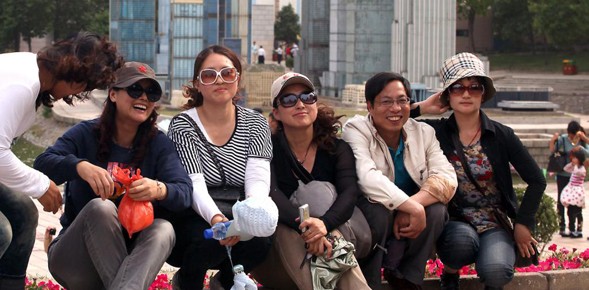Hong Kong can proudly show that it received 54.5 million foreign visitors in 2013 including 25.7 million of tourists. From this total however, 75% of all visitors and 66.6% of all tourists were from Mainland China. A number which continues to provoke angry reactions from Hong Kong residents and puts questions about the ability of a destination –Hong Kong or any other- to accommodate huge influx of visitors. A lesson for tourism authorities?
HONG KONG- Last Sunday, Chinese shoppers visiting the luxury stores of Canton Road,- a street parallel to Tsim Sha Tsui Road in Kowloon- were greeted but not in a way they enjoyed. Instead of welcoming signs, one hundred of protesters marched from the Star Ferry pier to Canton Road showing signs asking for the Hong Kong government to curb the number of mainlanders and hurling bad words at the visitors. ‘Locusts’ were to be heard in reference to the devastating animal. The event turned violent as protesters were confronted by anti-protesters and passers-by forcing Hong Kong police forces to intervene.
Hong Kong Government promptly condemned the move by the protesters, saying that it was only the act from extremists. The South China Morning Post reported that the government felt that the movement humiliated mainland visitors and tarnished the city’s image. Chief Secretary Carrie Lam Cheng Yuet-ngor condemned the protesters for disrupting public order, “directly affecting” the relationship with the mainland and harming the tourist industry. “We will absolutely not tolerate it if such events happen again,” it was reported by the South China Morning Post. “I believe such behaviour belongs to only a few extremists and definitely does not represent most citizens’ opinions and their values.”
The newspaper reported also the regrets and condemnations of Commerce minister Greg So Kam-leung and Security minister Lai Tung-kwok, while Constitutional and Mainland Affairs minister Raymond Tam Chi-yuen said the “barbaric and uncivilised activities” ran against Hong Kong’s values.
The protest is indeed regrettable and Mainland Chinese tourists should not be the easy target of Hong Kong public vindictiveness. “The Hong Kong Tourism Board respects freedom of speech and the rights of different organisations and groups to express their views and opinions. Nevertheless, under no circumstances should protestors disrupt social order and cause inconvenience to visitors and other residents of Hong Kong”, declares the department of corporate communication of Hong Kong Tourism Board when asked by traveldailynews.asia. “We do believe the protest is a singular incident, and the Hong Kong community in general welcome visitors from around the world”, adds the spokeswoman of HKTB.
China means a lot for Hong Kong if we look at data. Numbers are indeed impressive, in some ways even scary: from 54,298,804 foreign visitors (+11.7%) into the former British colony, 40,745,277 came from Mainland China last year. If only tourists are accounted (the ones spending at least one night), Hong Kong total came at 25,661,072 in 2013 up by 8%. From that number, 66.6% were from Mainland China (up by 13.1%).
The high number of tourists from the Mainland in the last 16 years –following the hand-over- helped Hong Kong economy by creating jobs and also by helping to buffer some of the negative effects of the financial crisis of 2008. Tourism represents up to 4.5% of Hong Kong economy.
But at the same time, locals complain more and more about rising prices, crowding public spaces, the scarcity of some goods –such as milk powder for example. Incidents of mainland Chinese behaving badly in Hong Kong have become a favourite in local media. Stories of Chinese kids peeing in MRT cars or on public dustbins abound in newspapers, further irritating ( if not infuriating) many Hong-Kong residents.
The frustration is obvious when strolling around Tsim Sha Tsui on week-ends. Hordes of visitors strol around with boxes and bags, people are queuing for anything, from buying a MRT ticket to get cash from an ATM or just to buy a hamburger and pavements are so crowded that it is almost impossible to move.
Some politicians also exploited residents’ rancours. Two political parties mulled out recently the option of levy an entrance tax of US$ 13 on non-residents arriving by land; an idea which was promptly rejected by Hong Kong’s Chief Executive Leung Chun-Ying.
The recent protest raises however an important question to any destinations around the world– and not only Hong Kong. How far can a destination cope with tourism rise? When is the psychological limit reached for locals?
Sunday incident gives an indication of the negative feelings of many Hong Kong residents about what is now perceived as a tourism invasion. Especially as Hong Kong Government recently claimed that the city could cope with an annual 100 million visitors by 2030. The incapacity of a destination to manage tourist flows properly can then turn dangerous and exacerbate negative feelings among locals.
Hong Kong government and HKTB are now working on providing the right answer to control potential collateral damages. By rebalancing for example tourist arrivals, especially as most long-haul markets or even traditional regional markets such as Japan or Singapore experienced decline last year. “It has been one of the HKTB’s key objectives to maintain a balanced visitor portfolio. In 2014, we will invest a large part, i.e. 75%, of our marketing resources in the international markets, and allocate the most of the remaining 25% to drive overnight arrivals from the non-Guangdong areas in Mainland China”, indicates HKTB.
The city government will need also to prove that it can accommodate and control the rise in the number of visitors. More infrastructure are certainly necessary. And probably an internal campaign to remind locals that Hong Kong remains a welcoming city to anyone…

Luc Citrinot a French national is a freelance journalist and consultant in tourism and air transport with over 20 years experience. Based in Paris and Bangkok, he works for various travel and air transport trade publications in Europe and Asia.













































































